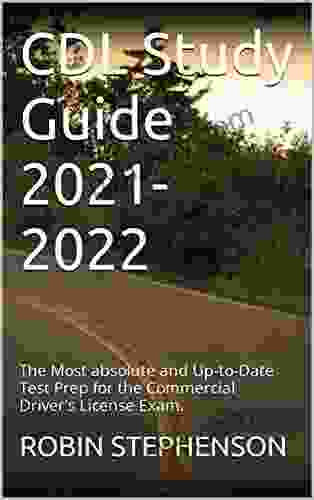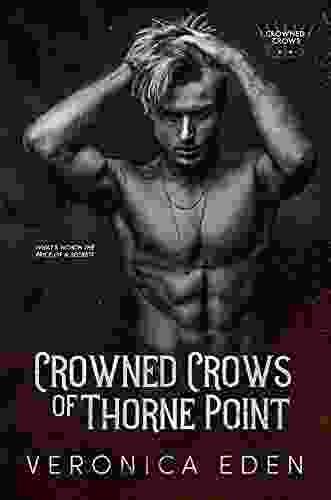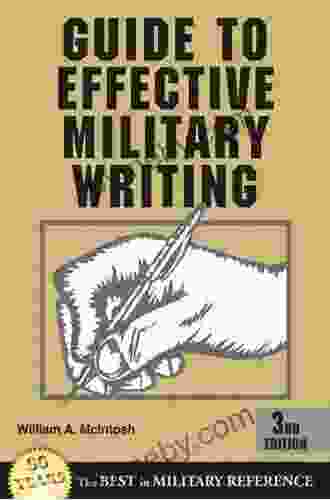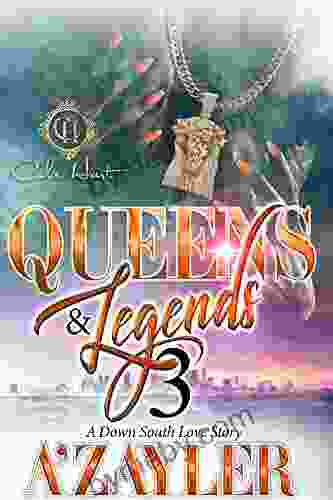Master the Art of Military Writing: A Comprehensive Guide

Effective military writing is an essential skill in today's complex and demanding battlefield environment. Whether you're drafting reports, writing persuasive proposals, or corresponding with superiors, the ability to communicate your ideas and information clearly, concisely, and impactfully is paramount.
4.3 out of 5
| Language | : | English |
| File size | : | 1951 KB |
| Text-to-Speech | : | Enabled |
| Enhanced typesetting | : | Enabled |
| Word Wise | : | Enabled |
| Print length | : | 244 pages |
| Screen Reader | : | Supported |
This comprehensive guide provides you with the tools and strategies you need to master the art of military writing. From understanding the unique style and terminology of military documents to crafting reports, correspondence, and persuasive messages, this guide will help you elevate your written communication to the next level.
Chapter 1: The Foundations of Military Writing
The Importance of Clarity
Clarity is the cornerstone of effective military writing. Your documents should be easily understood by all readers, regardless of rank, experience, or technical knowledge. Use simple, unambiguous language and avoid jargon or technical terms whenever possible.
Conciseness
Time is of the essence in military operations. Your writing should be as concise as possible without sacrificing completeness. Get to the point quickly and avoid unnecessary details or digressions.
Impact
Your writing should make an impact on the reader. Whether you're informing, persuading, or requesting, your goal should be to leave a lasting impression. Use strong verbs, active voice, and specific examples to make your writing more impactful.
Chapter 2: Understanding Military Style and Terminology
Military writing has its own unique style and terminology. It's essential to familiarize yourself with these conventions before you start writing.
- Use Formal Language: Avoid colloquialisms, slang, and contractions. Instead, use formal language and complete sentences.
- Follow the Style Guide: The Department of Defense (DoD) has published a style guide that provides guidance on grammar, punctuation, and formatting for military documents.
- Use Military Terminology: Use military terms and acronyms correctly. If you're unsure of a term, refer to a military dictionary or thesaurus.
Chapter 3: Crafting Effective Reports
Reports are a common form of military communication. They provide information on a specific subject or event. When writing a report, it's important to:
- Define Your Purpose: Determine the purpose of the report and write accordingly. The purpose should be clear from the outset.
- Gather Accurate Information: Ensure that the information in your report is accurate and up-to-date. Cite your sources and provide evidence to support your claims.
- Organize Your Content: Use a logical outline to organize the content of your report. This will make it easier for readers to follow your train of thought.
- Use Effective Writing Techniques: Apply the principles of clarity, conciseness, and impact to your writing. Use strong verbs, active voice, and specific examples to make your report more engaging.
- Proofread Carefully: Before submitting your report, proofread it carefully for any errors in grammar, punctuation, or formatting.
Chapter 4: Writing Persuasive Proposals
Persuasive proposals are used to convince readers to take a specific action or adopt a particular point of view. To write an effective persuasive proposal, you need to:
- Identify Your Audience: Understand your audience and tailor your proposal accordingly. Consider their interests, needs, and biases.
- State Your Proposition: Clearly state your proposal and provide a strong rationale for why it should be adopted.
- Present Evidence and Arguments: Provide compelling evidence and arguments to support your proposal. Use facts, statistics, and expert opinions to bolster your case.
- Anticipate and Address Objections: Identify potential objections to your proposal and provide counterarguments to address them.
- Conclude with a Call to Action: End your proposal with a clear call to action. Tell the reader what you want them to do and why they should do it.
Chapter 5: Effective Correspondence Writing
Correspondence writing is used to communicate with individuals and organizations outside the military. When writing correspondence, it's important to:
- Use Appropriate Tone and Language: Use a formal and respectful tone in your correspondence. Avoid using slang, contractions, or informal language.
- Follow Proper Formatting: Adhere to the standard formatting guidelines for correspondence, such as using letterhead, a proper subject line, and a professional closing.
- Be Clear and Concise: State your purpose clearly and concisely. Avoid unnecessary details or digressions.
- Proofread Carefully: Before sending your correspondence, proofread it carefully for any errors in grammar, punctuation, or formatting.
Chapter 6: Advanced Writing Techniques
Once you've mastered the basics of military writing, you can start to explore more advanced techniques to enhance your writing even further.
- Use Active Voice: Active voice makes your writing more concise and impactful. Instead of saying "The report was written by me," write "I wrote the report."
- Vary Your Sentence Structure: Avoid monotony by varying the length and structure of your sentences. This will make your writing more engaging and easier to read.
- Use Transitions: Transitions help readers follow your train of thought. Use words and phrases like "however," "therefore," and "" to connect your ideas and make your writing more coherent.
Effective military writing is a skill that can be developed through practice and dedication. By following the principles and strategies outlined in this guide, you can elevate your written communication to the next level and become an effective communicator in the military environment.
4.3 out of 5
| Language | : | English |
| File size | : | 1951 KB |
| Text-to-Speech | : | Enabled |
| Enhanced typesetting | : | Enabled |
| Word Wise | : | Enabled |
| Print length | : | 244 pages |
| Screen Reader | : | Supported |
Do you want to contribute by writing guest posts on this blog?
Please contact us and send us a resume of previous articles that you have written.
 Book
Book Novel
Novel Page
Page Chapter
Chapter Text
Text Story
Story Genre
Genre Reader
Reader Library
Library Paperback
Paperback E-book
E-book Magazine
Magazine Newspaper
Newspaper Paragraph
Paragraph Sentence
Sentence Bookmark
Bookmark Shelf
Shelf Glossary
Glossary Bibliography
Bibliography Foreword
Foreword Preface
Preface Synopsis
Synopsis Annotation
Annotation Footnote
Footnote Manuscript
Manuscript Scroll
Scroll Codex
Codex Tome
Tome Bestseller
Bestseller Classics
Classics Library card
Library card Narrative
Narrative Biography
Biography Autobiography
Autobiography Memoir
Memoir Reference
Reference Encyclopedia
Encyclopedia Steven Brust
Steven Brust Tetiana Elert
Tetiana Elert Neil Gaiman
Neil Gaiman Tamar Arslanian
Tamar Arslanian Thibault Busschots
Thibault Busschots Warrior Primal
Warrior Primal James Patterson
James Patterson Tara M Stringfellow
Tara M Stringfellow Heather Renee
Heather Renee Mayara De Godoy
Mayara De Godoy Winston Starr
Winston Starr Tayari Jones
Tayari Jones Greg Green
Greg Green Terry Fan
Terry Fan Sherri L Jackson
Sherri L Jackson Laurell K Hamilton
Laurell K Hamilton The Tudor Travel Guide
The Tudor Travel Guide Levent Yildizgoren
Levent Yildizgoren Zeena Shah
Zeena Shah Steve Sanfield
Steve Sanfield
Light bulbAdvertise smarter! Our strategic ad space ensures maximum exposure. Reserve your spot today!

 Devon MitchellThe Most Absolute and Up-to-Date Test Prep for the Commercial Driver License
Devon MitchellThe Most Absolute and Up-to-Date Test Prep for the Commercial Driver License Philip BellFollow ·11k
Philip BellFollow ·11k Liam WardFollow ·3.6k
Liam WardFollow ·3.6k Seth HayesFollow ·11.3k
Seth HayesFollow ·11.3k Dallas TurnerFollow ·4.4k
Dallas TurnerFollow ·4.4k Eugene ScottFollow ·15.1k
Eugene ScottFollow ·15.1k J.D. SalingerFollow ·13.1k
J.D. SalingerFollow ·13.1k Houston PowellFollow ·12.2k
Houston PowellFollow ·12.2k DeShawn PowellFollow ·4.7k
DeShawn PowellFollow ·4.7k

 Donald Ward
Donald WardUnveiling the Enthralling World of "Belong to the Baddest...
In the vibrant and...

 José Martí
José MartíCrowned Crows of Thorne Point: A Literary Odyssey into...
In the realm of literary masterpieces,...
4.3 out of 5
| Language | : | English |
| File size | : | 1951 KB |
| Text-to-Speech | : | Enabled |
| Enhanced typesetting | : | Enabled |
| Word Wise | : | Enabled |
| Print length | : | 244 pages |
| Screen Reader | : | Supported |

















